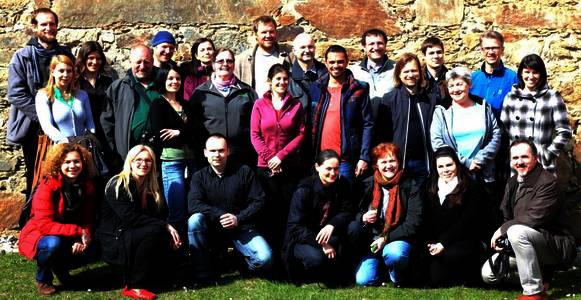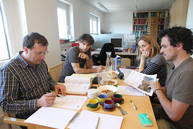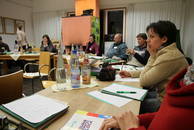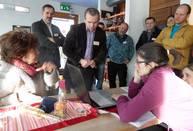
About the ESTO-Team
Germany
The partner consortium comprises partners from different backgrounds, involved in various aspects of traditional orchard farming and management. To enhance the network-oriented and disseminative approach of the project, we attach great importance to involving partners from different sectors (farming, education, agriculture, horticulture, environmental sector etc.). The German non-profit Thüringer Ökoherz e.V., promoting organic agriculture, landscape conservation and an overall eco-friendly lifestyle in Thuringia, is in charge of the project's coordination and management. Furthermore, Germany is represented by Grüne Liga Thüringen e.V., another non-profit, active in traditional orchard farming and management, renewable energies, sustainable development and environmental policy in general.
Austria
Two partners from Austria are involved in the ESTO project: OIKOS is an organisation, carrying out research on all aspects of environmental protection and best practices in nature conservation. OIKOS presents broad practical experience at the interface between agriculture and ecology (e.g. pomology) and in nature education, which will inarguably enrich the project. The other Austrian project partner, coming from the educational sector, is OWET - The School for Fruit Growing and IT, which plays a crucial role in the project, bringing in their pedagogical and didactical experience to the curriculum. The Umwelt-Bildungs-Zentrum Steiermark-UBZ is a professional partner in developing teaching material for environmental education.
Poland
Three Polish partners, covering three different work sectors, are members of the partner consortium. The Social Ecological Institute is active in the development of rural areas, introduction of inter-community platforms, self-governing projects, and initiatives in the field of organic farming, biodiversity protection and sustainable development. The Research Institute of Horticulture carries out general research activities, e.g. in the field of Pomology, Floriculture and Apiculture and is considered an expert in traditional orchards in Poland. Furthermore, the institute is a recognised teaching and training centre, bringing in pedagogical experience. The J. Dziubińska Agricultural Education Centre is an agricultural school, aiming at the inclusion of organic and traditional orchard farming into their teaching and training processes. The school provides valuable pedagogical competence and will be among those institutions, initially testing the traditional orchard curriculum.
Hungary
The Ecolinst - Ecological Institute for Sustainable Development aims to develop and promote ecological culture, ecological consumer awareness and environmental (ecological) education in Hungary. Ecolinst strives to protect traditional orchards and to design farming ecosystems, matching natural conditions. The Corvinus University of Budapest, through the Department of Pomology, is experienced in education and research. They offer several courses, e.g. dealing with orchard management, old fruit cultivars and organic farming. With their practical and empirical knowledge, CUB contributes to the elaboration of high quality project materials.
France
Solagro's ambition is to broaden the scope of possibilities within the fields of energy, agriculture and the environment in France. Due to many years of experience, Solagro cooperates with a wide network of institutions within France and in Europe, acting in various fields of agriculture and environment. SOL is also active in training and education, by organising trainings for students, advisers and farmers. Solagro supports traditional orchards by initiating local pilot projects, dealing with their management, product processing, communication, trainings and policy work.
Denmark
Blomstergaarden is a small private research centre, maintaining own gardens, providing a collection of fruit varieties as backup for the University of Copenhagen. They collect genetic material of fruits from Danish gardens, in order to maintain and increase fruit biodiversity in Denmark. BLO also serve as an adult education centre, organising workshops and public events, dealing with the traditional orchard issues.










